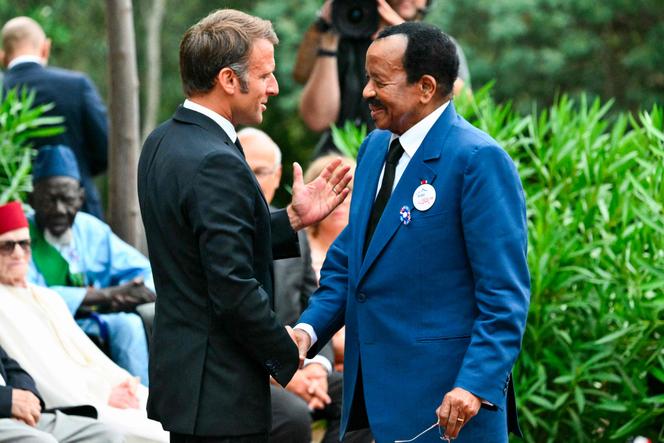


France on Thursday, August 15, commemorated the 1944 Allied landings in Provence, an event overshadowed by the Normandy landings two months earlier, but still key to the World War II endgame in Europe. Six African leaders joined official events as President Emmanuel Macron singled out the contribution of soldiers recruited – often forcibly – in French overseas colonies, notably in Africa.
It took decades for France to highlight the crucial role of non-white soldiers in the fighting. Cameroon President Paul Biya told Thursday's ceremony that their effort had been decisive. "There would have been no Allied victory without the contribution from the other peoples, without the foreigners," he said. "The fight was conducted together, to defend the universal values and ideas of peace and justice."
Macron added in his speech that "when it comes to defending the nation's vital interests all those who identify as French are called upon to come together."
"France forgets nothing of the sacrifices of the Congolese, the Beninese, nor of the peoples of Burkina Faso, Mali, Niger and so many others," he said.
Much of the second part of the day's events were canceled because of storm warnings, including a reception for guests on a helicopter carrier and a re-enactment of the landings in Toulon, at the center of fighting on August 15, 1944.
That day 100,000 American, British and Canadian troops landed on the beaches of the Var region on the French Riviera. They were followed by 250,000 soldiers fighting for France, recruited mostly from overseas colonies in Africa, with the aim of recapturing the key ports of Marseille and Toulon from the German occupiers. They succeeded within two weeks, having encountered only limited resistance from an exhausted German army.
African leaders were first invited to commemorate the landings only half a century after the war. In addition to Biya, Faure Gnassingbé of Togo and Faustin-Archange Touadéra of the Central African Republic were among Thursday's attendees. Officials from Niger, Mali and Algeria were not present, highlighting France's strained ties with those countries. Burkina Faso was represented by a chargé d'affaires.
The army in the Provence landings, commanded by General Jean de Lattre de Tassigny, included 84,000 French settlers from Algeria, 12,000 Free French troops and 12,000 Corsicans, but also 130,000 soldiers from Algeria and Morocco, and 12,000 from Senegal and France's Pacific and Caribbean possessions.
"France had forgotten us, but they're making up for lost time," said Oumar Diémé, a member of a delegation of former Senegalese infantrymen invited to the ceremony.
Macron's 2019 call to name streets in France after African combatants has largely gone unheeded, although some French towns remember the African contributions on monuments and memorial sites.
Relations between France and its African recruits were fraught. A December 1, 1944 showdown when French forces opened fire on African troops who demanded backpay long cast a shadow over ties. More than 35 were killed.
A beach landing of parachutists planned for later Thursday in honour of 5,000 Britons who landed there in the night of August 14-15, 1944 was canceled as weather services warned of thunderstorms in the region.
Overall, Allied forces suffered some 1,000 deaths on August 15, 1944, compared to more than 4,400 Allied deaths in Normandy.
On Wednesday, a statue of Robert Tryon Frederick, the US commander of airborne troops in Operation Dragoon, was unveiled in La Motte, the first Provence village to be liberated.
